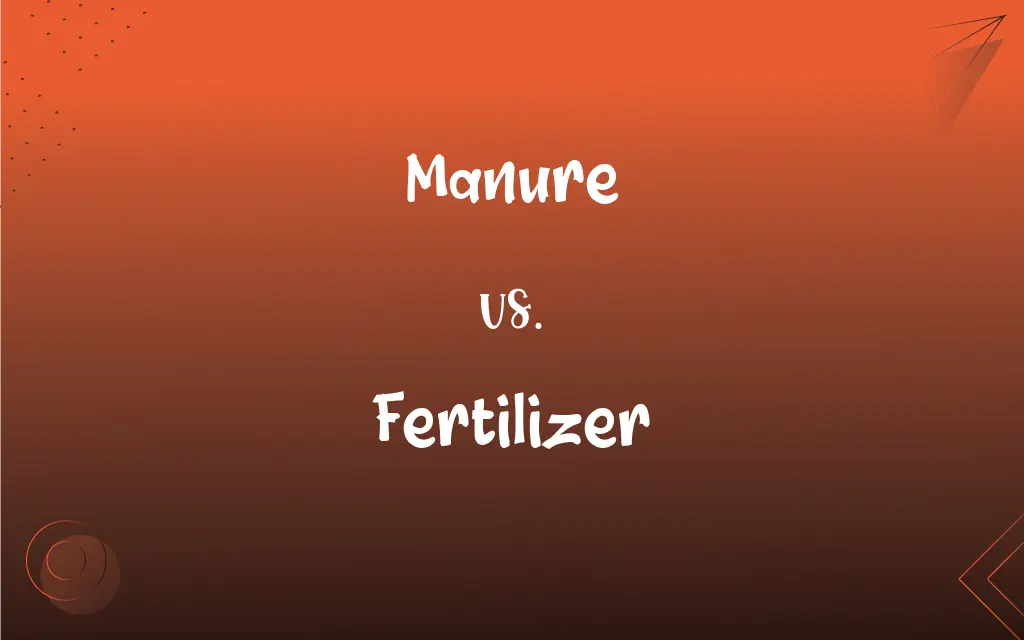Manure vs. Fertilizer: What's the Difference?
Edited by Janet White || By Harlon Moss || Updated on July 29, 2024
Manure is organic matter derived from decomposed plants or animal excrement, while fertilizer is a substance added to soil to enhance nutrient content and promote plant growth.

Key Differences
Manure typically refers to the organic matter, mainly derived from the decomposition of animal waste or plant residues. Fertilizer, on the other hand, refers to any substance, whether organic or inorganic, used to add essential nutrients to the soil, promoting plant growth.
Manure, being natural and organic, contains a wide range of nutrients, but in varying and often lower concentrations. Fertilizers, especially synthetic ones, contain specific nutrients in defined and higher concentrations.
Fertilizers, especially synthetic ones, contain specific nutrients in defined and higher concentrations. The application of manure not only nourishes the soil but also improves its structure, water retention capacity, and microbial activity. In contrast, while fertilizers provide a quick nutrient boost, they might not always enhance the soil's overall health or structure.
Choosing between manure and fertilizer often hinges on the specific needs of the soil and the crops being grown. While manure acts slowly, releasing nutrients over time, fertilizers are faster-acting, giving plants an immediate nutrient boost.
Comparison Chart
Composition
Organic matter from decomposed plants or animals
Can be organic or synthetic, with specific nutrient
ADVERTISEMENT
Nutrient Concentration
Generally lower and varies
Higher and specific
Origin
Natural, often from animal waste
Natural or manufactured
Soil Health
Improves structure, microbial activity, and water retention
Primarily boosts nutrients
Release Time
Slow-releasing
Faster-acting, especially synthetic types
Manure and Fertilizer Definitions
Manure
A substance that improves soil health and fertility.
The crops responded well to the manure applied last season.
ADVERTISEMENT
Fertilizer
A substance added to soil to increase its nutrient content.
The roses bloomed brilliantly after fertilizer application.
Manure
Organic waste used in farming.
The smell of fresh manure wafted from the fields.
Fertilizer
A soil amendment for enhancing productivity.
The fields were treated with a high-phosphorus fertilizer.
Manure
Decomposed organic matter from animal or plant origins.
Farmers use cow manure to enrich the soil.
Fertilizer
A chemical or natural substance used to promote plant growth.
Tomatoes require a balanced fertilizer for optimum yield.
Manure
Animal excrement used to fertilize land.
Chicken manure is rich in nitrogen.
Fertilizer
An agent that supplies essential nutrients to plants.
Without adequate fertilizer, the plants appeared stunted.
Manure
A natural substance for enriching soil.
The garden thrived with the addition of manure.
Fertilizer
Compounds that ensure optimal plant development.
The farmer mixed various fertilizers to create a custom blend.
Manure
The dung of livestock or poultry.
Fertilizer
Any of a large number of natural and synthetic materials, including manure and nitrogen, phosphorus, and potassium compounds, spread on or worked into soil to increase its capacity to support plant growth.
FAQs
What is manure?
Manure is organic matter, primarily derived from animal feces, used to enrich soil.
Does manure have a specific composition?
Manure composition varies based on animal diet and bedding, but typically contains nitrogen, phosphorus, potassium, and microorganisms.
Is manure safe for all plants?
Mostly yes, but it's best when composted first to reduce pathogens and weed seeds.
How does manure improve soil?
Manure adds organic matter, improves soil structure, and increases water retention.
Where is manure commonly sourced from?
Manure is often sourced from livestock like cattle, horses, pigs, and poultry.
How are fertilizers labeled?
They're often labeled with three numbers representing the percentage of nitrogen (N), phosphorus (P), and potassium (K) they contain.
Can excessive use of fertilizer be harmful?
Yes, over-fertilization can harm plants, disrupt soil ecosystems, and cause water pollution.
What is green manure?
Green manure refers to crops grown and then incorporated into the soil to improve its quality.
What is fertilizer?
Fertilizer is a substance added to soil to enhance its nutrient content and promote plant growth.
Are there different types of fertilizers?
Yes, fertilizers can be organic (from natural sources) or inorganic (chemically synthesized).
Are there any risks with using manure as fertilizer?
Manure can contain pathogens or weed seeds, so it's often best to compost it first.
Why is potassium important in fertilizers?
Potassium aids in plant metabolic processes, disease resistance, and overall growth.
Do fertilizers expire?
While they don't "expire," their effectiveness can decrease over time, especially if exposed to moisture or extreme temperatures.
manure or fertilizer?
Neither is universally better. The choice depends on the specific needs of the soil and plants, and personal preference.
Can manure and inorganic fertilizers be used together?
Yes, they can complement each other, but it's important to avoid over-fertilization.
Are there environmental concerns with using chemical fertilizers?
Yes, they can contribute to water pollution, soil acidification, and other environmental issues if used improperly.
Can manure and fertilizer affect pH levels in the soil?
Yes, they can alter pH levels, so regular soil testing is advisable.
How do nutrient release rates compare between manure and chemical fertilizers?
Manure releases nutrients slowly over time, while chemical fertilizers often offer a more immediate nutrient supply.
How should I store manure and fertilizer?
Store in a cool, dry place away from direct sunlight. For manure, consider composting before storage.
Is manure considered a type of fertilizer?
Yes, manure is a type of organic fertilizer.
About Author
Written by
Harlon MossHarlon is a seasoned quality moderator and accomplished content writer for Difference Wiki. An alumnus of the prestigious University of California, he earned his degree in Computer Science. Leveraging his academic background, Harlon brings a meticulous and informed perspective to his work, ensuring content accuracy and excellence.
Edited by
Janet WhiteJanet White has been an esteemed writer and blogger for Difference Wiki. Holding a Master's degree in Science and Medical Journalism from the prestigious Boston University, she has consistently demonstrated her expertise and passion for her field. When she's not immersed in her work, Janet relishes her time exercising, delving into a good book, and cherishing moments with friends and family.
































































